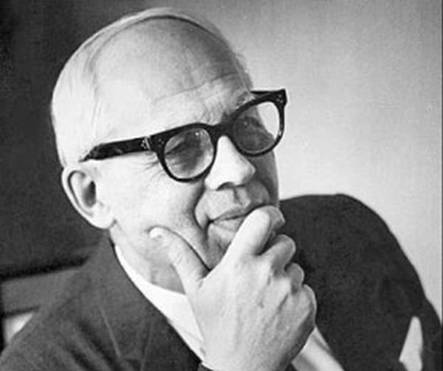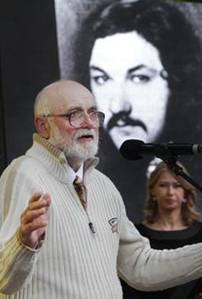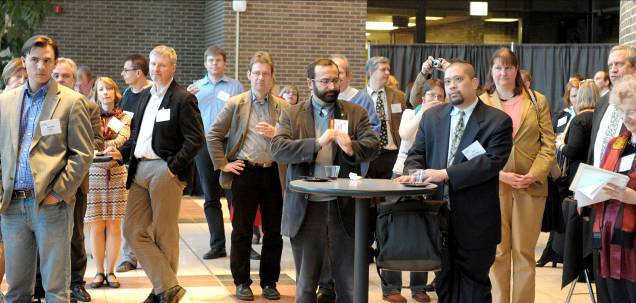
THE VOICE OF INTERNATIONAL LITHUANIA
|
VilNews has its own Google archive! Type a word in the above search box to find any article.
You can also follow us on Facebook. We have two different pages. Click to open and join.
|
Author Archive
Nazi – not Nazi?
- Posted by - (0) Comment

Juozas Ambrazevičius or Juozas Brazaitis
The controversial case of Juozas Ambrazevius Brazaitis' (1903-1974) remains being returned to Lithuania for re-burial this week
Juozas Ambrazevičius or Juozas Brazaitis was a Lithuanian literary historian, better known for his political career and nationalistic views. He was acting Prime Minister of the Provisional Government of Lithuania, the so-called Nazi puppet government, from 23 June 1941 to 5 August 1941.
He later joined an anti-Nazi movement, until he escaped from Lithuania by the end of WWII.
A document by the US Committee on the Judiciary, House of Representatives, from January 1975, states that Brazaitis was removed from the list of Alleged Nazi War Criminals and that further investigations had been stopped. But Efraim Zuroff, leader of the Simon Wiesenthal Centre in Israel, says: "At the time the Americans didn't have the data that clearly point to his connection to the Nazis and to anti-Jewish violence." Here is a copy of the 1975 document...

- Bookmark :
- Digg
- del.icio.us
- Stumbleupon
- Redit it
Nazi – not Nazi?
- Posted by - (7) Comment

Juozas Ambrazevičius or Juozas Brazaitis
The controversial case of Juozas Ambrazevius Brazaitis' (1903-1974)
remains being returned to Lithuania for re-burial this week
Juozas Ambrazevičius or Juozas Brazaitis was a Lithuanian literary historian, better known for his political career and nationalistic views. He was acting Prime Minister of the Provisional Government of Lithuania, the so-called Nazi puppet government, from 23 June 1941 to 5 August 1941.
He later joined an anti-Nazi movement, until he escaped from Lithuania by the end of WWII.
A document by the US Committee on the Judiciary, House of Representatives, from January 1975, states that Brazaitis was removed from the list of Alleged Nazi War Criminals and that further investigations had been stopped. But Efraim Zuroff, leader of the Simon Wiesenthal Centre in Israel, says: "At the time the Americans didn't have the data that clearly point to his connection to the Nazis and to anti-Jewish violence." Here is a copy of the 1975 document...
Aage Myhre President Adamkus honoured Ambrazevicius-Brazaitis with "Lietuvos didžiojo kunigaikščio Gedimino ordino Didžiojo kryžiaus" (the highest order of the Lithuanian State) on 6 July 2009. This obliges the government to honour him with a State funeral.... Which will take place Sunday 20 May. No ceremony in Vilnius as it has been stated by the Israeli newspaper Haaretz...
Read the Haaretz article here:
http://www.haaretz.com/print-edition/features/glorifying-a-nazi-collaborator-in-lithuania-1.430508

There's a documentary film being released this weekend
about Juozas Ambrazevicius-Brazaitis <> Here's what the producer of the
film says about Brazaitis:
"Gaila, kad tokie žmonės nėra įvertinti visuomenės. Juozas
Ambrazevičius-Brazaitis yra apdovanotas valstybiniais apdovanojimais ir
įvertintas kaip vienas iš svarbiausių kovų už Lietuvos laisvę dalyvių. Bet šio
jausmo nėra mūsų visuomenėje. Jaunimas tiesiog jo nežino, tad pasirinkimas buvo
natūralus. Kitas svarbus dalykas, kad Juozas Ambrazevičius-Brazaitis pagaliau
bus perlaidotas tėvynėje – tai labai svarbus įvykis mūsų istorijoje ir būtų
gėda niekaip neįamžinti šios datos."
rough translation:
"It's a shame the people like him aren't appreciated. Brazaitis was
awarded the nations highest honors, & is appreciated as one of the most
important fighters for Lithuania's freedom. But this feeling is missing in our
society. Todays youth knows nothing about him. Another important thing, his
body will finally be laid to rest in Lithuania, which is a very important event
in our nations history, & would it would be shameful not to immortalize
this date"
(I'm posting this not as a supporter of Brazaitis, which i'm not, but for
everyone to understand why some Lithuanians honor him)
Dokumentinio filmo premjerą pristatantis Saulius Bartkus: tai – šioks toks patriotizmas | 15min.lt
Televizijos laidų prodiuseris Saulius Bartkus, be laidų prodiusavimo, labai domisi istorija ir prieš keletą metų pradėjo kurti dokumentinius filmus.
Lars Persen
This is a huge dilemma for Lithuania. Since the Soviet
opression was both so hard and long quite a few Lithuanians rank the time under
Germany the better, in stead of expressing an equally strong historical
condemnation of both Nazi Germany and communist Soviet. Considering both
sides destruction of Jewish communities in Lithuania and their atrocities, nor
German or Soviet collaborators should be acknowledged! Giving Brazaitas a
post-mortem re-funeral in Lithuania is surprising and sad.
One can in 1941 understand his action, when one takes to account that the German at the time challenged the Soviet occupation. But in retrospect no Nazi collaborator should be honored, no matter what his intentions were!
Linas Johansonas Lars
Persen wrote: "One can in 1941
understand his action, when one takes to account that the German at the time
challenged the Soviet occupation. But in retrospect no Nazi collaborator should
be honored, no matter what his intentions were!"
Shouldn't the same apply to those who collaborated with the Russians?
Aurelijus Baltušis
Extracts
from a Report by Einsatzgruppe a in the Baltic Countries:
“It was no less important to establish as unshakable and provable facts for the
future that it was the liberated population itself which took the most severe
measures, on its own initiative, against the Bolshevik and Jewish enemy,
without any German instructions being evident.
In Lithuania this was achieved for the first time by activating the partisans**
in Kovno. To our surprise it was not easy at first to set any large-scale
anti-Jewish pogrom in motion there.
Klimatis, the leader of the partisan group referred to above, who was the first
to be recruited for this purpose, succeeded in starting a pogrom with the aid
of instructions given him by a small advance detachment operating in Kovno, in
such a way that no German orders or instructions could be observed by
outsiders.[...]
Both in Kovno and in Riga evidence was taken on film and by photographs to
establish, as far as possible, that the first spontaneous executions of Jews
and Communists were carried out by Lithuanians and Latvians.”
http://www.jewishvirtuallibrary.org/jsource/Holocaust/Einsatz_Baltic.htm
Darius Udrys Since when do civilized countries make heroes out of Nazi collaborators? Brazaitis failed the most important test of a good leader: to protect the innocent and stand up for what is right. This adulation is an instance of staggering moral imbecility.
- Bookmark :
- Digg
- del.icio.us
- Stumbleupon
- Redit it
- Posted by - (0) Comment
love me

Rimgaudas Vidzunas, Arizona
Rimgaudas Vidzunas’ story is similar to those of many other Lithuanian- American children who were born while their parents fled Stalin's Red Army.
Rim has been back in his parents' homeland and do much to keep the memory alive. Still it is with a certain soreness he answers NO when I ask if he ever heard from the Lithuanian authorities. Not a single letter, no phone call from the home country's leaders. No one from home has told Rim and many other refugee children that they are loved by the ancestral homeland, that they are welcome back now that the communism yoke is lifted off. It seems, unfortunately, that today’s Lithuanian leadership has not done much to restore contact with this most valuable of all resources, namely its own people around the globe.
Read Rim’s story HERE
and see also the below comments
___________________________
Rim, “We love you!”

Jenifer C. Dilis
Rim, "We love you!"
It may be from this complete stranger, but it is still genuinely sent...:)
Keep going back to Lietuva...Nothing is stopping you and "the others" from visiting.
I know NOTHING of politics, government policies, grudges held from one to another...
I DO know that we are all human beings who seek to belong, to fit in, to feel welcome.
IS there truly an unspoken disregard for "Displaced Lits" among those who stayed behind for whatever the reason?!?
I am confused...I am in love with MY Lietuva because it is the homeland of all four of my grandparents. I know they all were HERE in the US by 1930, when my parents were born. Does that mean that I should love MY Lietuva any less, if my grandparents were not there much past their own teenage years? And worse, does My Lietuva love ME less for this limited immediate linkage to it?!?!
I am suddenly saddened...
Sorry I went off track...I do that quite often...oops...:)
Rim, I love you....GO VISIT YOUR LIETUVA!!! :)
Jenifer C. Dilis,
Massachusetts
___________________________
Rim, You've helped create a real sense of unity among us

Boris Bakunas
DPs Rule! Thanks for starting this great thread of comments. You've helped create a real sense of unity among us. I can identify with everyone one of the comments posted, and I wish all of you well.
"My mom stepped off the ship in Boston with a suitcase in one hand and me in the other. Grandfather washed dishes at the Waldorf Hotel Cafeteria. When we moved to Chicago, we lived in a basement -- not a basement apartment, but a basement with a concrete floor, an iron-cast sink, and bed sheets hung on ropes to separate the sleeping area from where we ate."
So many of us have similar childhood memories.
So many of us worked hard, saved money, sent money to Lithuania just as soon as it was allowed, and bought our own homes. So many or us graduated college and earned higher degrees, or our children have.
So many of us finally got to reunited with those of our relatives who survived the Soviet occupation.
Good Wishes to All!
Boris Vytautas Bakunas,
Chicago
- Bookmark :
- Digg
- del.icio.us
- Stumbleupon
- Redit it
40 years since 19-year-old Romas Kalanta publicly set fire to himself in protest against Soviet rule
- Posted by - (1) Comment
![]()

Antanas Kalanta speaking on the 40 year commemoration day for the death of his brother Romas
A special ceremony took place in the Lithuanian parliament on Tuesday to mark 40 years since 19-year-old dissident Romas Kalanta publicly set fire to himself in protest against Soviet rule.
On May 14, 1972, Kalanta burned himself in the garden of the Music Theater in Vilnius, shouting “Freedom to Lithuania!” He wrote in his notebook, “I blame my death on the regime alone.”
KGB agents buried Kalanta on May 18, two hours before scheduled, to avoid crowds. Then, 3,000, mostly young supporters of Kalanta who gathered near his house began moving toward the central street of the city. A subsequent two-day protest was eventually put down by Soviet police, soldiers, and militia who arrested 402 people. Of these, 33 who faced administrative punishment, and six were punished as ‘hooligans’ and ‘anti-social elements’.
In 1990, Kalanta’s tomb became legally recognized as an historical monument. He has become the subject of several books and a documentary called Children of the Fountain.
In 2000, Kalanta was posthumously awarded the Order of the Cross of Vytis. In 2002, a monument was unveiled at the site of the self-immolation. In 2005, he was given the status of a freedom fighter.
- Bookmark :
- Digg
- del.icio.us
- Stumbleupon
- Redit it
Should there be gay parades in Lithuania?
- Posted by - (0) Comment

In 2010 the Lithuanian Attorney General's Office insisted security was the only reason it had asked the court to annul a license for what would have been Lithuania's first gay pride march in Vilnius. "Whose fault would it be if anyone gets hurt? It might look like we are homophobic, but I am not sure if we'd look better with pictures of violence on TV," Attorney General Raimundas Petrauskas said. He believed radical and violent groups are organizing protests and provocations against the participants of the gay march.
 Irene Simanavicius, Toronto, Canada |
Today homosexuality is discussed everywhere we go. It is shown through the television, movies, and books. Being a Homosexual in today’s society comes with many hardships. Although it has been more frequently discussed and talked about, there is always discrimination. Types of discrimination towards someone’s sexual preference are name-calling, hate crimes, firing from a job, violence, murders, and vandalism of property. Unfortunately, when you are not part of the norm you are picked on and discriminated against. Homosexuality is becoming a more common and open thing but it still has people disagreeing with its moral values. Homosexuality has many issues that It has to face in the future. As a society today, we will have an open mind to homosexuality but there will always be discrimination by someone, somewhere. |
 Viktorija Ruškulienė, New Jersey, USA |
“Lithuania has a great distance to walk towards democracy. Cases presented to court cannot be used as a statistical data, as the Lithuanian judicial system is corrupt and not working in many cases, people do not resolve their problems by law, as it’s done in other European countries. For example, police will not assist street or domestic violence incident until a murder or serious injuries take place. The rape victim has to have two witnesses of the “rape in action”, otherwise the case will be dismissed (my friend was in this unfortunate situation: raped by a policeman and had no witnesses).She was told that case will never reach the court.” |
- Bookmark :
- Digg
- del.icio.us
- Stumbleupon
- Redit it
Should there be gay parades in Lithuania?
- Posted by - (2) Comment

In 2010 the Lithuanian Attorney General's Office insisted security was the only reason it had asked the court to annul a license for what would have been Lithuania's first gay pride march in Vilnius. "Whose fault would it be if anyone gets hurt? It might look like we are homophobic, but I am not sure if we'd look better with pictures of violence on TV," Attorney General Raimundas Petrauskas said. He believed radical and violent groups are organizing protests and provocations against the participants of the gay march.
 Irene Simanavicius, Toronto, Canada |
Today homosexuality is discussed everywhere we go. It is shown through the television, movies, and books. Being a Homosexual in today’s society comes with many hardships. Although it has been more frequently discussed and talked about, there is always discrimination. Types of discrimination towards someone’s sexual preference are name-calling, hate crimes, firing from a job, violence, murders, and vandalism of property. Unfortunately, when you are not part of the norm you are picked on and discriminated against. Homosexuality is becoming a more common and open thing but it still has people disagreeing with its moral values. Homosexuality has many issues that It has to face in the future. As a society today, we will have an open mind to homosexuality but there will always be discrimination by someone, somewhere. |
Irene Simanavicius ~ There has been a lot of activity for the last forty years with what has been called the “Gay Revolution”. It has been going on since 1960’s to sustain drive for gay rights, and seek to end discrimination against homosexuality originated in employment, credit, housing, public accommodations and other areas of life. This led to the start of Gay Pride Week that takes place in late June. Gay Pride Week is an annual Celebration of the “Stone Wall” or “Christopher Street” riots. These celebrations and demonstrations began in an atmosphere created by young people especially in college. Homosexuality began to be viewed as “unnatural”. By the end of the 19th century, medicine and psychiatry were competing with religion and law over sexuality. It started to be seen as a crime and a sin. Today homosexuality is look as both right and wrong. There are ongoing debates on the highly controversial issue. I was so pleased to see that this was a topic that was discussed in VilNews and jumped at the opportunity to cheer this on. Living in North America we are all trying to be become tolerant of all of the diversity that surrounds us on a daily basis.
Homosexuality has become a very big part of today’s society. It effects a lot of people especially friends and family of a homosexual. Unfortunately, many families disown their own sons or daughters that are homosexual. Most of this happens because they are afraid, they don’t have enough information, or they are angered or too shocked to think rationally. Sometimes one parent will be all right with their child’s’ choice while the other can’t accept it.
Many friends of homosexuals are often confused about the situation and have many questions. Some examples of questions are: If you spend a lot of time with a gay person will you become gay? How did they become gay? If my brother is gay, will I become gay? Questions that seem really easy to answer are serious if you were put in a situation with no information.
Today homosexuality is discussed everywhere we go. It is shown through the television, movies, and books. Being a Homosexual in today’s society comes with many hardships. Although it has been more frequently discussed and talked about, there is always discrimination. Types of discrimination towards someone’s sexual preference are name-calling, hate crimes, firing from a job, violence, murders, and vandalism of property. Unfortunately, when you are not part of the norm you are picked on and discriminated against. Homosexuality is becoming a more common and open thing but it still has people disagreeing with its moral values. Homosexuality has many issues that it has to face in the future. As a society today, we will have an open mind to homosexuality but there will always be discrimination by someone, somewhere.
Homosexuality will never be a comfortable issue to talk about but we can help make a difference in their lives by supporting them as we would any individual.
But I digress…The comments were on going in the article, and it was quite evident we were quite divided. Due to the difference of opinions and language barriers between some of the contributors of this very heated debate, we were starting to become intolerant of one another. Opinions and ideas were getting misinterpreted, people were getting upset, we had some of us insulting one another due to the perimeters of which we were able to share our strong feelings and opinions that it became quite apparent that we would have to shelve this for awhile or like we say here in North America TIME OUT!!!
 Viktorija Ruškulienė, New Jersey, USA |
“Lithuania has a great distance to walk towards democracy. Cases presented to court cannot be used as a statistical data, as the Lithuanian judicial system is corrupt and not working in many cases, people do not resolve their problems by law, as it’s done in other European countries. For example, police will not assist street or domestic violence incident until a murder or serious injuries take place. The rape victim has to have two witnesses of the “rape in action”, otherwise the case will be dismissed (my friend was in this unfortunate situation: raped by a policeman and had no witnesses).She was told that case will never reach the court.” |
A wonderful thing occurred; a lovely woman from Lithuania and now lives and works in the USA by the name of Viktorija Ruškulienė popped up and had this to write on Facebook:
The roots of today’s gay right issue lies in the democracy of western civilization, which evolved to the level, where discrimination based on medieval religious dogmas are not tolerated anymore. In Lithuania only two centuries ago pregnant women were labeled “dirty” and were not allowed to attend churches (the main social gathering of that time). Only in 20th century women received the rights to own property, seek education and have competitive careers. And now the time came for homosexuals to have equal rights with heterosexuals in seeking happiness through marriage and family, not to be discriminated by employers and feel safe to live openly in local communities. There are more social issues to be resolved in Lithuania: women and child abuse, bullying in schools, sexual harassment in work place, employment discrimination, corruption in government and judicial systems, etc.
Lithuania has a great distance to walk towards democracy. Cases presented to court cannot be used as a statistical data, as the Lithuanian judicial system is corrupt and not working in many cases, people do not resolve their problems by law, as it’s done in other European countries. For example, police will not assist street or domestic violence incident until a murder or serious injuries take place. The rape victim has to have two witnesses of the “rape in action”, otherwise the case will be dismissed (my friend was in this unfortunate situation: raped by a policeman and had no witnesses).She was told that case will never reach the court. My friend hoped that her complaint on file will help future victims, but the complaint and medical exam results were delivered the very next day to the rapist, who threatened whole family of the victim and forced her to withdraw the complaint.
The roots of today gay right issue lay in democracy of western civilization, which evolved to the level, where discrimination based on medieval religious dogmas is not tolerated anymore. In Lithuania only two centuries ago pregnant women were labeled “dirty” and were not allowed to attend churches – the main social gathering of that time. Only in 20th century women got rights to own property, seek education and have competitive careers. And now the time came for homosexuals to have equal rights with heterosexuals in seeking happiness through marriage and family, not to be discriminated by employers and feel safe to live openly in local communities. There are more social issues to be resolved in Lithuania: child and woman abuse, bullying in schools, sexual harassment in work place, employment discrimination, corruption in government and judicial systems, etc. Lithuania has a great distance to walk towards democracy.
Cases presented in court cannot be used as a statistical data, as the Lithuanian judicial system is corrupt and not working in many cases, people do not resolve their problems by law, as it’s done in other European countries. For example, police will not assist street or domestic violence incident until murder or serious injuries take place. The rape victim has to have two witnesses of the “rape in action”, otherwise the case will be dismissed (my friend was in this unfortunate situation): raped by a policeman and had no witnesses. She was told that case will never reach the courts. My friend hoped that her complaint would stay on file that will help future victims, but the complaint and medical exam results were delivered the very next day to the rapist, who threatened the whole family of the victim and forced her to withdraw the complaint.
Everybody knows about how purposely “tangled” and “irresolvable” the case of a little girl, abused by pedophiles… We cannot skip steps in our path to democracy, if we want our children to live in a civilized society.
For me, all this homophobia and so called "rightful" and "pure" marriage definition is so absurd. If I had one child homosexual, one heterosexual, the third transgendered, and fourth one - frigid, would I support only one child in his/hers pursue of happiness? And which one would I need to choose? And who would determine that? Ruling political party? The church? The neighbors?
Lithuanians have lived under oppression for 50 years under the Soviet fist, and now people are rising in their pursuit to create civil democratic society. I'm happy to see how many Lithuanian citizens came to protect the little girl, abused by pedophiles and tormented by the Lithuanian judicial system. These people didn’t have similar situations in their family, but they united in defense of an unjustly system.
As long as only minority people alone defend their rights, the situation will not improve; majority shall protect any unjust treatment of other citizens. Someone here mentioned high suicide statistics in Lithuania. To be more precise: male suicide is the highest in Europe, and the roots of it lay in the sexist mentality.
In Lithuania there is stereotype of a “real man” prevailing, which puts lots of pressure on the man: he is the achiever, family provider, physically strong heterosexual male. In real life and present economically difficult situation very few men belong to this category. Every man at one or another in his life will fail this definition. The “real man” or “real woman” or “real marriage” concepts are understood differently by various individuals and social or religious groups. And when these concepts are forced on not conforming individual, they destroy a person’s self-esteem; it will make this person retreat and live “closeted” life, often lead suppressed person to suicide.
Lithuania is making leaps, not small steps in adopting and implementing EU Constitution and entering EU economical zone. This has consequences: local economy and society are not always ready for big adjustments. Lithuania is very small country and it does not follow US as a model, so all these comparisons to US democracy are only brought here to our attention because this is what we know the best. US build its democracy towards economical and military world leadership. US does not have problems like low birth rate and dying/emigrating nation, post Communism economy, post genocide and suppression mentality. "National heritage" and "National language" in US have totally opposite meaning of what it is in Lithuania.
A lot of Lithuanians do not want to accept the “Gay Issue” issue not due to hate or intolerance of different lifestyle. People think that pressuring gay population into heterosexual behavior it will help to recover our disappearing nation. They believe that this is a moral issue, that heterosexuality could be taught to children and accepted by influencing a person. I disagree as well, but when I talk to people in Lithuania, that's what most of them say, even medical doctors with decades of work experience think they can force everyone into heterosexuality.
The younger generation in Lithuania’s bigger cities is very promising; they have attitudes similar to any western European youth. Of course there are some hate and bullies, who are ready to attack a man with long hair or someone openly showing gay behavior, but this happens in rural areas, where differences are not tolerated. Gay parade happens in Vilnius.
I myself admire village culture, but this is universal: big cities shelter people with broader spectrum of cultural differences. My classmate from Vilnius Technical University, skinny guy with long hair, when went to visit his parents in rural area near Panevėžys, had to run all the way from bus station to his parent's house, since bullies were just waiting to get him, beat him and cut his hair.
Rural culture tends to separate itself from the city, they think: "oh, this is spoiled city problem, we don't have this", nevertheless village culture preserves tolerant, true to nature and human roots mentality, which city culture lacks.
An example from my personal experience: special needs child from the city by everyone was labeled as "challenging", in need of special treatment and help, requiring stretch of tolerance; while visiting rural area the same child was accepted as normal and treated with no difference, other kids were happy to adjust and tried different ways to communicate with the newcomer. When finally I couldn’t help myself but bring this issue up to someone’s attention, it was explained to me: "We have different kids born and we love them all, they all have different ways to be normal when they grow up". Go figure :)))
I know many good families with good intentions and they cannot tolerate gay behavior, just because they lack understanding.
Sex with intention of reproducing is lesser sin than sex which leads only to satisfaction (medieval thinking). Good families torment their own children who are born different. Once a gay marriage and adoption is legal and commonly practiced, parents will accept their gay children with greater ease.
Parents add pressure to their adult children into getting married and having children, this is acceptable and normal, and if someone due to health issue cannot reproduce - it's forgiven, but if someone does not reproduce because that's their choice - "more pressure should solve it". Will this formula work with a gay couple? If gay marriages and adoptions are legal, why not?
- Bookmark :
- Digg
- del.icio.us
- Stumbleupon
- Redit it
Global Baltic ‘family reunion’ in Chicago
- Posted by - (0) Comment

U.S. Senator Dick Durbin, who traces his roots to Lithuania, spoke on the
topic of “the unbreakable U.S.-Baltic partnership,” and referred to
the conference as “a family reunion.”
Photo: Jurgis Anysas.
By Ellen Cassedy
“The Global Baltics: The Next Twenty Years” was the subject of the 23rd biennial conference of the Association for the Advancement of Baltic Studies (AABS). The conference took place April 26-28 at the University of Illinois at Chicago.
“We are truly the global Baltics,” said Robert Vitas, chair of the Chicago-based Lithuanian Research and Studies Center, in an opening address. “Wars, migrations, and deportations have wrenched our people beyond our national boundaries. Lithuania is home in our hearts, but the countries of the diaspora are also home.”
- Bookmark :
- Digg
- del.icio.us
- Stumbleupon
- Redit it
Global Baltic ‘family reunion’ in Chicago
- Posted by - (0) Comment

U.S. Senator Dick Durbin, who traces his roots to Lithuania, spoke on the
topic of “the unbreakable U.S.-Baltic partnership,” and referred to
the conference as “a family reunion.”
Photo: Jurgis Anysas.
By Ellen Cassedy
“The Global Baltics: The Next Twenty Years” was the subject of the 23rd biennial conference of the Association for the Advancement of Baltic Studies (AABS). The conference took place April 26-28 at the University of Illinois at Chicago.
“We are truly the global Baltics,” said Robert Vitas, chair of the Chicago-based Lithuanian Research and Studies Center, in an opening address. “Wars, migrations, and deportations have wrenched our people beyond our national boundaries. Lithuania is home in our hearts, but the countries of the diaspora are also home.”

More than 200 scholars from 15 countries participated, including some from as far away as Japan and Brazil. Scholars in the field of Lithuanian studies made up about one-quarter of the participants.
Sixty speeches, roundtables, and panel discussions explored Baltic history, literature, linguistics, political science, aesthetics, culture, sociology, psychology, economics, gender, anthropology, musicology, environment, education, and public health.
Numerous members of Chicago’s Baltic-American community turned out for the opening session, which was addressed by the three Baltic ambassadors to the U.S. and two White House representatives.
U.S. Senator Dick Durbin, who traces his roots to Lithuania, spoke on the topic of “the unbreakable U.S.-Baltic partnership,” and referred to the conference as “a family reunion.”
Ever since its beginnings in 1968, according to Bradley Woodworth of the University of New Haven, AABS has striven to maintain strong ties with the émigré communities. “We foster a high level of scholarship,” he said, “but we also want to reflect a deep emotional tie” with the Baltics.
Not only the Baltic nations themselves but the Baltic émigré communities were under discussion.
Some presentations focused on the home countries – for example, the Estonian contribution to digital music, Baltic linguistics in Renaissance Europe, the Latvian SS Voluntary Legion, Soviet art in Lithuania, and Poles in contemporary Klaipeda.
But others focused on such topics as whether the mission of early Lithuanian immigrants to the U.S. was to preserve or to create Lithuanian identity; the meaning of “Lithuanian-ness” outside Lithuania; and the state of Baltic archives and libraries in North America.
Past president Guntis Smidchens, of the University of Washington, recalled that from the very beginnings of the association in 1968, AABS conferences have served as a valuable place for Baltic scholars to share research and seek critiques of their papers. To begin with, “you didn’t need to show where the Baltics were on the map,” he said. “Everyone knew.”
Today, Smidchens said, the conferences are changing, as scholars from the Baltic countries themselves are able to attend, and Baltic studies are on the rise in Europe. At the same time, he voiced disappointment that Baltic language courses are being eliminated at U.S. universities.
Woodworth emphasized that for him, Baltic studies means an exploration of all the peoples who live in the Baltic lands. “The emphasis on Estonia, Latvia, and Lithuania as nation-states has been a real strength,” he said, “but that can go too far. I study the people who live in a certain region, not ethnicities per se. This is not a place for Baltic nationalism.”
Scholars of all three Baltic countries not only joined together in formal discussions but chatted at the coffee urns.
Did the conference create a “pan-Baltic” spirit– a sense of fellow-feeling among Estonians, Latvians, and Lithuanians across national boundaries? Some participants said they felt it, while others did not.
The conference was not all work. Participants perused the exhibits of books and journals and explored the lavish display of artifacts and manuscripts mounted by the Lithuanian Research and Studies Center. In a session chaired by Violeta Kelertas, of the University of Washington, Baltic fiction writers from the U.S. and Canada entertained the participants by reading from their short stories and novels. A Latvian and a Lithuanian men’s choir serenaded the gathering. There was a dinner and a play performance. And conference chair Giedrius Subacius, of the University of Illinois at Chicago, was feted with a rousing Lithuanian birthday song.
The next AABS conference, to be held jointly with the Society for the Advancement of Scandinavian Studies, will take place at Yale University, March 13-15, 2014. Some travel stipends will be offered. Two “sister’ conferences are also in the works. For more information: http://depts.washington.edu/aabs/.
 |
Ellen Cassedy traces her Jewish family roots to Rokiskis and Siauliai. Her new book, We Are Here: Memories of the Lithuanian Holocaust, was published in March and will appear in Lithuanian in May. She lives in Washington, D.C. Visit her website at www.ellencassedy.com. |
- Bookmark :
- Digg
- del.icio.us
- Stumbleupon
- Redit it
Craving for a barbeque on a Lithuanian lakeside
- Posted by - (0) Comment
![]()

Read Saulene’s barbecue article HERE
- Bookmark :
- Digg
- del.icio.us
- Stumbleupon
- Redit it
![]()

Peter Modeen
Dear Saulene,
Very nice lyrical picture of spring and summer in Lithuania. We used to live with my wife in Vilnius for almost ten years and came to love the country very much. The lakes and the forests reminded us of our native country, Finland. I used to do orienteering with Lithuanian friends and the events often took place in the lake district. We have visited Lithuania several times since we moved to Costa del Sol in Spain in 2005. But the last time was two years ago and your story made me long for visiting your beautiful country soon again.
Peter Modeen
Spain
- Bookmark :
- Digg
- del.icio.us
- Stumbleupon
- Redit it
Your comment made me very happy :)
- Posted by - (6) Comment
![]()

Dear Peter,
I'm very grateful for your comment, it made me very happy :) It's very nice to get a feedback on what you doing and especially such a great one.
Hope you'll be able to visit Lithuania as soon as possible :)
- Bookmark :
- Digg
- del.icio.us
- Stumbleupon
- Redit it
“EU very consistent in sending messages to Ukraine about the importance of justice being done.”
- Posted by - (0) Comment
![]()

Yevhenia Tymoshenko, daughter of Yulia Tymoshenko, addresses supporters of opposition parties in front of a screen displaying a picture of her jailed mother at a May 12 rally in Kyiv.
European Union foreign ministers have been meeting in Brussels to mull a bloc-wide boycott of European soccer championship games scheduled to be held next month in Ukraine.
The EU has been critical of Ukraine over the alleged ill-treatment of jailed opposition leader Yulia Tymoshenko, who is serving a seven-year sentence for abuse of office in connection with a gas deal with Russia when she was prime minister.
EU foreign-affairs chief Catherine Ashton said the EU had been "very consistent in sending messages to Ukraine about the importance of justice being done."
Several European leaders have already vowed to boycott Ukraine during Euro 2012, which Ukraine is hosting jointly with Poland, after Tymoshenko said she was beaten by prison officials last month and launched a hunger strike.
- Bookmark :
- Digg
- del.icio.us
- Stumbleupon
- Redit it
- Posted by - (0) Comment

Rimgaudas "Rim"
Vidziunas
“The LT government didn’t call to say they love me.”
This was the headline of an article we brought earlier this week, about Rimgaudas "Rim" Vidziunas in Arizona, USA. Rim and many other American-Lithuanians have been doing much to keep the memory of Lithuania alive. When I asked if he ever heard from the Lithuanian authorities, he told me that no one from the homeland had ever told him or other refugee children that they are loved by the ancestral homeland, that they are welcome back now that the communism yoke is lifted off.
It seems, unfortunately, that today’s Lithuanian leadership has not done much to restore contact with this most valuable of all resources, namely its own people around the globe – the diasporas.
And even worse is that when these 'refugee children' are trying to make contact with Lithuanian leaders themselves, they will very often not even receive replies.
Sadness pit dug even deeper.
Here a couple of emails we received some time ago, from two American-Lithuanians born in their home country before the war:
____________________________________________________________________
Sending e-mail to LT is
like sending it to the black
hole of the universe

Vytautas Sliupas
Dear Aage:
Lithuania's business people and government officials are yet to learn the necessity of good communications. Without a two way communication there is no possibility for further contacts. One of the most frustrating experiences I had was in e-mail (before that it was in regular "snail mail") communications. I would write and write but receive no reply (with only a few exceptions).
When I was working, our management had a rule - "answer all letters received in not more than three days. If there is no answer to be given, than at least acknowledge the receipt".
One of my American colleagues, who was sincerely trying to help Lithuania, said "Sending e-mail to Lithuania is like sending it to the black hole of the universe. Everything goes one way and nothing comes back".
No wander he is now disenchanted and helping others.
Vytautas Sliupas, P.E.
www.aukfoundation.org
Burlingame, California
____________________________________________________________________
"Dummheit und Stolz
wachsen auf einem Holz"
(Pride and ignorance are akin)

Stan Backaitis
Dear Aage,
Several months ago I had arranged a visit between the minister of energy and a CEO of an important nuclear reactor manufacturer. The meeting was supposed to be for the benefit of the minister on information of what is forthcoming in the future, particularly in small reactors and the possibility of establishing a European affiliate of the company in Lithuania.
The minister graciously extended an invitation to the CEO, but the minister's secretariat refused to extend even the slightest courtesy to this visit, such as picking up the visitor from the airport and transporting him to the meeting, setting up a meeting agenda, or even providing to the visitor's office the address of the ministry. They claimed that this was just another sales visit, and the visitor should take care of everything on his own. As a result the CEO canceled the meeting and eventually went to London. The European affiliate was established in the UK. Thus through such arrogance another opportunity was lost.
There is a lot truth in the German proverb "Dummheit und Stolz wachsen auf einem Holz".
Best regards,
Stan Backaitis
Washington, USA
- Bookmark :
- Digg
- del.icio.us
- Stumbleupon
- Redit it
- Posted by - (0) Comment

Rimgaudas "Rim"
Vidziunas
“The LT government didn’t call to say they love me.”
This was the headline of an article we brought earlier this week, about Rimgaudas "Rim" Vidziunas in Arizona, USA. Rim and many other American-Lithuanians have been doing much to keep the memory of Lithuania alive. When I asked if he ever heard from the Lithuanian authorities, he told me that no one from the homeland had ever told him or other refugee children that they are loved by the ancestral homeland, that they are welcome back now that the communism yoke is lifted off.
It seems, unfortunately, that today’s Lithuanian leadership has not done much to restore contact with this most valuable of all resources, namely its own people around the globe – the diasporas.
And even worse is that when these 'refugee children' are trying to make contact with Lithuanian leaders themselves, they will very often not even receive replies.
Sadness pit dug even deeper.
Here a couple of emails we received some time ago, from two American-Lithuanians born in their home country before the war:
____________________________________________________________________
Sending e-mail to LT is
like sending it to the black
hole of the universe

Vytautas Sliupas
Dear Aage:
Lithuania's business people and government officials are yet to learn the necessity of good communications. Without a two way communication there is no possibility for further contacts. One of the most frustrating experiences I had was in e-mail (before that it was in regular "snail mail") communications. I would write and write but receive no reply (with only a few exceptions).
When I was working, our management had a rule - "answer all letters received in not more than three days. If there is no answer to be given, than at least acknowledge the receipt".
One of my American colleagues, who was sincerely trying to help Lithuania, said "Sending e-mail to Lithuania is like sending it to the black hole of the universe. Everything goes one way and nothing comes back".
No wander he is now disenchanted and helping others.
Vytautas Sliupas, P.E.
www.aukfoundation.org
Burlingame, California
____________________________________________________________________
"Dummheit und Stolz
wachsen auf einem Holz"
(Pride and ignorance are akin)

Stan Backaitis
Dear Aage,
Several months ago I had arranged a visit between the minister of energy and a CEO of an important nuclear reactor manufacturer. The meeting was supposed to be for the benefit of the minister on information of what is forthcoming in the future, particularly in small reactors and the possibility of establishing a European affiliate of the company in Lithuania.
The minister graciously extended an invitation to the CEO, but the minister's secretariat refused to extend even the slightest courtesy to this visit, such as picking up the visitor from the airport and transporting him to the meeting, setting up a meeting agenda, or even providing to the visitor's office the address of the ministry. They claimed that this was just another sales visit, and the visitor should take care of everything on his own. As a result the CEO canceled the meeting and eventually went to London. The European affiliate was established in the UK. Thus through such arrogance another opportunity was lost.
There is a lot truth in the German proverb "Dummheit und Stolz wachsen auf einem Holz".
Best regards,
Stan Backaitis
Washington, USA
- Bookmark :
- Digg
- del.icio.us
- Stumbleupon
- Redit it
![]()

Lithuania will probably miss a deadline to narrow its budget deficit, threatening the Baltic nation’s access to the European Union development grants that have driven economic growth, the bloc’s executive arm said.
The fiscal gap may shrink 2.3 percentage points in 2012 to 3.2 percent of gross domestic product, exceeding the 3 percent limit set by the EU for a fifth year, the European Commission said today in an e-mailed statement from Brussels. The shortfall may drop to 3 percent in 2013, it added.
The grants helped Lithuania’s economy expand 5.9 percent in 2011, the second-fastest pace in the 27-member EU behind Estonia. Growth will slow to 2.4 percent this year, the commission said, cutting a previous 3.4 percent forecast.
- Bookmark :
- Digg
- del.icio.us
- Stumbleupon
- Redit it
- Posted by - (0) Comment
*LGTB = lesbian, gay, bisexual, and transgender


Viktorija Ruškulienė
As we learned in 5-th grade of school: “a human is a social creature, typically living in small flocks, called families, surrounded by extended group, called society”. Some people choose to live alone or separated (less than 1%), but most seek happiness in relation and affection with other individuals. 49% of human nation are women and not all women will have children in their lives, and not all mothers will survive to see their children grow to adulthood. Nature programmed women to share their responsibility and happiness of raising offsprings with selected biological or non-biological group, called family. Children raised by public groups (when no constant caregiver participates in child’s upbringing) are called orphans and they experience great hardships in their lives. No human can survive without support and care of other human until adolescence (unless his name is Mowgli). In order to protect human survival Nature programmed us to experience greatest happiness by devoting ourselves to children, this period of life is called parenthood and most of humans do not have fulfillment in their lives without experiencing it. Each member of human society shall have a right to live in a family and experience parenthood, even if that person did not produce own biological offsprings. These rights can be altered by society only if person committed severe crime against human life or welfare. I do not know anyone, who rightfully shall be denied the right to get married or raise children, and I closely know people of many races, Christians, Muslims, Buddhists, Atheists, non-religious-non-atheists, most are heterosexuals, some homosexuals, few transgendered, some cannot have children and want to become parents, some had children and gave them up for adoption, most are parents and very happy about it, some are parents and never stop complaining about it, few decided not to have a partnership in life, most live with one partner, some are only happy with more than one partner, some live happily in partnership without sex, some believe that sex is a main thing in their lives, some talk about sex and show their sexuality publicly, some hide it and never talk about it – we are all humans, no group is better than other. If I’ll be in Lithuania next year in the summer, I’ll take my kids, and maybe some friends will join us as well, to march in a gay pride parade. And if there will be event to raise awareness of women and child abuse in Lithuania, I’ll be the first to attend.
Viktorija Ruškulienė
New Jersey, USA
______________________

Kenny Kaunas
Since I don't live in Lithuania, I have a question for those that do: Have the conditions for the LGBT community improved since 2010?
______________________

Aage Myhre Kenny, there are some points of hope. This is what the new Klaipeda Mayor said to me in an interview last year: "Opposite to any former mayors of Vilnius and Petras Gražulis himself, Klaipėda, and I personally, welcomes gay prides and gay communities. The whole idea of censorship is based on ridiculous logics, as psychologist O. Tapinas said once correctly “if you observe birds for a while you will become bird yourself”. I think we are talking about so called “10% society” and the rest 90% can’t be “persuaded” into homosexuality. Denial will only increase frustration in society." https://vilnews.com/?p=7374
______________________

Kenny Kaunas Sergey: I'm sure you're right. I know that there is an upcoming event, and I sincerely hope it goes well. The parade of 2010 was a blemish to say the least. For some reason I have a problem with the word "tolerance". Hopefully, people can accept the fact that people are BORN that way.
______________________

Kenny Kaunas Aage: It's nice to know that the current mayor is more progressive!
______________________

Aage Myhre I agree. And, in fact I think our constant pressure, from the www.VilNews.com, side for more normality and balanced understanding, begins to help a little bit...
______________________

Kenny Kaunas Absolutely, there are many people abroad who are concerned with this particular issue, as well as other issues. I still don't understand why the Lithuanian Christian Democratic Party exists. I read Vilnews every day, Aage. For someone who doesn't speak Lithuanian, it really helps to bridge the gaps. I thank you, and your contributors for keeping the various communities informed.
______________________

Kenny Kaunas Aage, there's no doubt in my mind that LGBT culture will integrate into Lithuanian society. I live in Toronto, which is probably one of the most multicultural cities in North America. I have many gay friends, and being a heterosexual male, I can walk into a gay bar and feel just as comfortable as I would in any other bar. There are radio stations and television channels dedicated to their community (which are accessible in Lithuania as well). I understand the psychological ramifications of 50 years of occupation can be quite damaging, but that cannot be an excuse for these displays of hatred. Lithuania is obviously very Catholic, but religion has no place in politics. I am by no means religious, and I really don't understand why it's so difficult to separate the two. It's an indoctrination of a belief system that marginalizes people who don't subscribe to that ideology. Yet, it has governing power. I can't even comment on the Neo Nazis. That's just too depressing. There was a time when Toronto had skinheads, many of them are now reformed, and many of them were beaten to death. Either way, nothing positive can come from hate en masse. Something needs to be done about that, yesterday.
______________________

Daiva Repeckaite Of course they would not prefer it in a more welcoming environment. But work is not only about getting hired and paid. It's also about informal communication, team-building trips, celebrating a successful end of a project with your team and all that. Your position and pay may be the same, but if colleagues feel uncomfortable sitting next to you in a sauna, or sleeping in the same tent, or feel awkward in your presence in general (and such ignorance CAN be expected, as many people don't realize that LGBT persons are not solely defined by their sexuality), you may want to conceal it 'for the peace of mind'. You may want to go for a drink with a same-sex colleague and don't have others giggling that it's a date.
And think about multisexuals - learning that their friend is 'undecided' about their sexual preference makes many people very, very uneasy.
Also, remember my comment about the president's electoral campaign.
______________________

Kenny Kaunas I understand your viewpoint. Ultimately, I think it's up to the individual whether or not they want to "out" themselves. If someone who's gay is comfortable enough with one of their colleagues, I don't see why they wouldn't mention it. Just because someone is openly gay, it doesn't mean the world has to know. Frankly, it's no-one’s business really. If someone tells you they're gay, they obviously trust you implicitly. It's extremely personal. If I told someone a personal story, I would assume they'd respect the fact that it was personal, and they'd know not to blab. However, the feeling of uneasiness is fear of the unknown. That has to be confronted in order to help foster acceptance and mutual understanding. I think "knowing your audience" is key.
- Bookmark :
- Digg
- del.icio.us
- Stumbleupon
- Redit it
VilNews e-magazine is published in Vilnius, Lithuania. Editor-in-Chief: Mr. Aage Myhre. Inquires to the editors: editor@VilNews.com.
Code of Ethics: See Section 2 – about VilNews. VilNews is not responsible for content on external links/web pages.
HOW TO ADVERTISE IN VILNEWS.
All content is copyrighted © 2011. UAB ‘VilNews’.

 Click on the buttons to open and read each of VilNews' 18 sub-sections
Click on the buttons to open and read each of VilNews' 18 sub-sections 





















.jpg)



